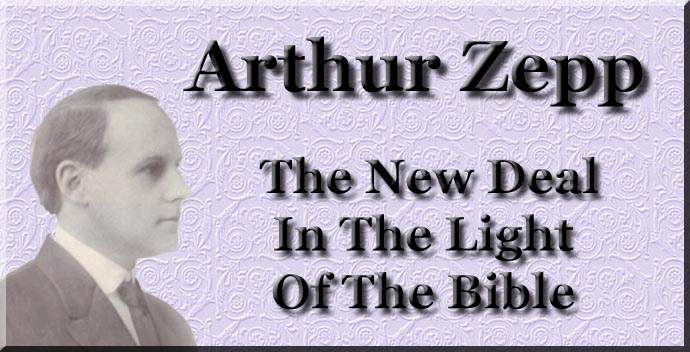
The New Deal In The Light Of The Bible
By Arthur Zepp
Chapter 1
NEW OPENNESS OF MIND TO SANE ECONOMICSOne gracious fruitage of the depression is openness of mind to sane economics. A typical statement of this spirit was made by Clarence Francis, General Foods Corporation: "This is the hour for the rebuilding of America by means of an economic revival on sound economic foundations." Quick to reject crack-brained economic panaceas, this teachable mood seeks a safe way out of "the iron furnace" of suffering. It will weigh the stimulating, searching, and challenging economic program of the Bible by the scientific method, as any other contribution on economics, "separate the precious from the vile," and retain that which meets the test of verification. Bible economic principles have made America great. They promise peace, progress, prosperity. They comport with the utmost business common sense. They answer our perplexed question, "What, in economics, is best?" and point the way out of our present national dilemma. A return to these impregnable economic fundamentals will again make our national business welkin ring with joy, ORIGIN -- SOME CHARACTERISTICS The Benign Author of Bible economic principles gave them to govern the production and distribution of all things needful to His creature, man. They equal in their incomparable, all-comprehensive, equitable, and workable character the prodigal munificence, in the raw, of food, fuel, raiment, shelter, comforts, the production and distribution of which they were intended to govern. The perversion of principles so sound, workable, impartial, adequate -which can never be outmoded, which meet all ages and conditions of mankind -- calls for an accounting. Hence research in Bible economic sources reveals that the most courageous, searching, and pointed rebukes are directed to those rulers who perverted the true function of government -just economic administration -- into a throne of iniquity and oppression; who substituted bribery and spoliation for service to the people; rulers "In whose hands is mischief, and their right hand is full of bribes" (Ps. 26:10). For: "When the righteous are in authority, the people rejoice: but when the wicked beareth rule, the people mourn... The king by judgment establisheth the land: but he that receiveth gifts [bribes] overthroweth it" (Prov. 29:2, 4). CARDINAL POSTULATE Basic in Bible Economics is brotherly consideration and service -- REAL CO-OPERATION: "They helped every one his neighbor; and every one said to his brother, Be of good courage. So the carpenter encouraged the goldsmith, and he that smootheth with the hammer him that smote the anvil, saying, It is ready for the soldering: and he fastened it with nails, that it should not be moved" (Isa. 41:6, 7). Again: "By love serve one another" (Gal. 5:13). Ignoring brotherly love, consideration, and service is economic suicide. Chastisement fell upon those who "remembered not the brotherly covenant" (Amos 1:9). UNIVERSAL SCOPE No race has a monopoly of benefit in Bible Economics. Their Author designed universal benefit: "Blessed is the nation [any nation] whose God is the Lord" (Ps. 33:12). A typical statement of His universal interest: "Blessed be Egypt my people, and Assyria the work of my hands, and Israel mine inheritance" (Isa. 19:25). PRIVILEGE -- PERVERSION -- PUNISHMENT Bible Economics prophets, millenniums ago, pronounced fearful denunciations upon rulers who amidst the superabundant bounty of nature's provision for the people's needs, artificially generated and sustained depression and panic, and warned kings, princes, and judges that, unless they reformed, appalling judgments from God would requite their moral insensibility. These prophets also placed them under a divine edict not to claim God's sanction because, forsooth, they worshipped God formally in the Temple, and forbade them to speak of His statutes while they mocked Him by perverting just economics: "Shall the throne of iniquity have fellowship with thee, which frameth mischief by a law?'" (Ps. 94:20). "But unto the wicked God saith, What hast thou to do to declare my statutes, or that thou shouldest take my covenant in thy mouth? Seeing thou hatest instruction, and castest my words behind thee" (Ps. 50: 16, 17). Searching words for rulers and ministers of State and Church! King David, the Psalmist, then adds a word about being "a partaker of other men's sins": "When thou sawest a thief, then thou consentedst with him" (Ps. 50:18), which we would call the guilt of being accessory to the fact of theft. |
|
 |
 |
|
|
|
-
Site Navigation
 Home
Home What's New
What's New Bible
Bible Photos
Photos Hiking
Hiking E-Books
E-Books Genealogy
Genealogy Profile
Free Plug-ins You May Need
Profile
Free Plug-ins You May Need
 Get Java
Get Java.png) Get Flash
Get Flash Get 7-Zip
Get 7-Zip Get Acrobat Reader
Get Acrobat Reader Get TheWORD
Get TheWORD